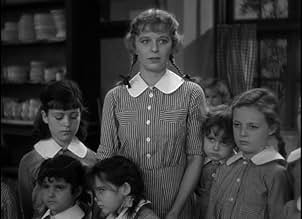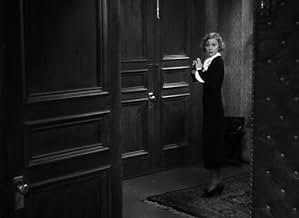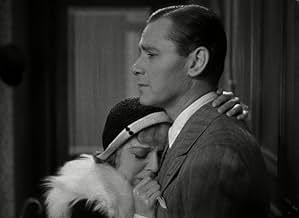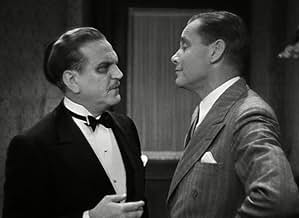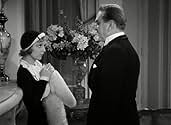Aggiungi una trama nella tua linguaA naive girl just out of a cloistered orphanage finds that being a 'good fairy' to strangers makes life awfully complicated.A naive girl just out of a cloistered orphanage finds that being a 'good fairy' to strangers makes life awfully complicated.A naive girl just out of a cloistered orphanage finds that being a 'good fairy' to strangers makes life awfully complicated.
- Regia
- Sceneggiatura
- Star
- Premi
- 2 vittorie totali
- Shoeshine Man
- (non citato nei titoli originali)
- Schoolgirl in Orphanage
- (non citato nei titoli originali)
Recensioni in evidenza
These stories can seem a tad daft or childish, especially when compared to the sophistication and raciness of the classic screwballs. The Good Fairy however makes its innocent sweetness palatable by never getting too close to reality in its setting or situations. The Eastern-European location is reminiscent of the divine "Ruritanian" style of the early Paramount musicals. Preston Sturges's dialogue is witty enough to keep a continuous background level of silliness without threatening to distract from the plot. The original story, by the way, is by Ferenc Molnar, whose most famous work is Liliom (upon which Carousel was based) and while the Good Fairy is not supernatural there are many similarities in tone.
Director William Wyler could have treated the Good Fairy as a straightforward comic ramble, but he leaves the superb cast to bring out the funny business. He instead adds depth to the love angle, shooting as if this were a serious romantic drama. One significant trick he pulls is the in the pace he gives to different parts of the film. Margaret Sullavan's dinner with Reginald Owen and the scenes at the party are very busy, with the crowds in the background constantly moving, sometimes passing in front of the principle actors. This gives a daunting atmosphere and prevents the scenes from getting in any way romantic. In contrast, Sullavan's scenes with Herbert Marshall are at a more relaxed pace, in long unbroken takes, and this brings out the warmth of their moments together.
And now onto that sublime cast, which is surely the best thing about the Good Fairy. The picture opens with Alan Hale, who gets things off to a suitably silly start. Frank Morgan and Reginald Owen have a hammy bluster about them which adds to the aforementioned bustle of those early scenes. It may seem odd to see Eric Blore out of his familiar butler territory, but it's not a problem. Blore is so naturally entertaining I would quite happily watch him playing Lady MacBeth. Pushed and pulled between these oddballs, Margaret Sullavan gives the one naturalistic performance of the whole show, and a remarkable one at that. And then there is Herbert Marshall, one of the most intrinsically likable players of the era. It's odd, because Marshall looks and sounds a lot like George Sanders, but while Sanders looks like the kind of bounder who writes relatives out of his will on an annual basis, Marshall is the sort of man you'd trust with the pin code to your life savings. And that's why he works so well here. In fact, the only bad thing about Marshall's casting is that the barber is right – he really does look better with the beard.
There are really no flaws in the Good Fairy, at least none worth dwelling on. The only reason I wouldn't call it a masterpiece is that there is nothing supremely good about it. It is emotional without being poignant, funny without being hilarious. But the Good Fairy entertains, just as a square meal fills us up, and who would ask for a gourmet dinner every night of the week?
The nice thing is there is no murders, explosions, mayhem or outright evil. All these things get in the way of DIALOG. I watch this film in awe, there is musical rhythm in the first third of the film combining dialog, action and music. You will really like all these people at the end of the film.
Time Well Spent., No Noise
The script, being by Preston Sturges, is funny and witty and artfully plotted. Sullavan was a great actress/star of the '30's early '40's who unfortunately is mostly forgotten now. She has a quality, a sly subtle acidity that makes her different from other screwball heroines. She also had the knack of bringing out the tenderness in her male leads (James Stewart was never more suave, articulate, and keenly perceptive than opposite the funny cruel little egomaniac Sullavan in The Shop Around the Corner, which is a masterpiece, and she brought out the early best in her former husband, Henry Fonda, in The Moon's Our Home, which is another forgotten little gem). It's not so much she's vicious a la Bette Davis or the divine Barbara Stanwyck: she's too minutely picky, petty really in getting what she wants, too self-centeredly rational in getting her way for that. But, anyway, The Good Fairy has a younger softer Sullavan. The supporting cast is superior, too.
Molnár's play tells the story of an amoral young woman named Lu, a theater "usherette" loved by a handsome but poor waiter. Lu would prefer to get ahead in the world by taking advantage of her rich (and married) admirer Konrad. Lu considers sleeping with Konrad, but because she finds him unattractive puts him off by claiming that she's already married, to a lawyer. When Konrad insists on helping her husband professionally -- in hopes of bedding Lu as a reward -- she picks a name out of the phone book at random: Max Sporum. From there things get complicated, but it's interesting to note that in Molnár's play the sexually sophisticated Lu acts only as matchmaker (thus, "good fairy") to the three men in her life, successfully pairing off each one with another woman while remaining single herself. Sturges retained this basic framework but made his Luisa (Margaret Sullavan) far more innocent: she's fresh from an orphan asylum, and totally unschooled in the ways of the world, particularly where men are concerned. In Sturges' version Detlaff the waiter (Reginald Owen) is an older man who is protective of Luisa in a fatherly way but not romantically interested, while the rich middle-aged businessman Konrad (Frank Morgan) initially seems to be a horny roué, but turns out to be an old softy. And where Molnár's Max Sporum was a homely man already involved with his secretary, the lawyer in this film is played by debonair Herbert Marshall, the secretary has been eliminated, and eventual romance between Luisa and Max is assured.
How much of this plotting was imposed on Sturges by the demands of the censors is irrelevant, ultimately, because he succeeded in imposing his own raffish sensibility onto the material despite the unlikely elements, such as Luisa's almost otherworldly innocence and the entirely benevolent interest shown in her by all of these older men. The Hays Office was never much of an impediment to Sturges, anyhow; besides, he slipped a couple of surprisingly risqué lines past the censors here, as he would elsewhere. The plot of this movie depends heavily on Luisa's childlike qualities, and probably wouldn't work nearly as well if she were more sophisticated. If The Good Fairy had been made a few years earlier in the "Pre-Code" era it surely would have been spicier, but might have lost something, too. As it stands, the film strikes just the right balance between sauciness and sweetness, without too much of either element.
Sturges' script is brought to life on screen by a cast of exceptional actors. Margaret Sullavan is quite perfect as Luisa, obviously smart but also stunted by her upbringing. Sullavan conveys the character's innocence without coming off as an idiot, which is no easy trick. Frank Morgan is delightful as Konrad, the wealthy businessman whose interest in Luisa sets the story in motion and changes everyone's life. (Coincidentally, Morgan, who is best remembered for his performance in the title role as The Wizard of Oz a few years later, compares himself to a wizard at one point in a conversation with Luisa.) Herbert Marshall gives perhaps the best comic performance of his career in the unlikely role of impoverished lawyer Max Sporum, a man so delighted by his improved status in life that he waxes eloquent on the subject of a new pencil sharpener. Marshall is a charming actor who deserves to be better remembered; he had one of the best voices of his day, along with Ronald Colman and George Sanders. Reginald Owen is at something of a disadvantage, as his character of Detlaff is rather one-dimensional, but he gives it all he's got and grows on you by the end. The supporting cast is full of the colorful players who used to populate these movies in Hollywood's Golden Age (Alan Hale, Beulah Bondi, Eric Blore, etc.) and who make their limited screen time count.
I've seen The Good Fairy three times now, and enjoy it more with each viewing. I'm still catching funny lines that flew past while I was laughing at something else, and how often can you say that about any comedy? Oh, and don't miss the comic high point, a movie-within-a- movie parody that's as funny as anything Sturges ever wrote.
Lo sapevi?
- QuizMargaret Sullavan wanted control on the set of the movie, and did spiteful things to get her way. Script girl Freda Rosenblatt said: If she was tired and wanted to go home and Willy had one more scene to do, she would smear the makeup on her face. That would mean everything had to stop so she could be made up again. Which might take hours. So they couldn't shoot. Maggie got so bored between scenes she went behind one of the sets and purposely lay down on the dusty floor. The beautiful white dress she was wearing was a wreck. That stopped everything. -- Despite all this, she and Wyler fell in love and were married during the filming.
- Citazioni
Dr. Schultz: I see... and what is it you're looking for, Mr. Schlipkohl?
Schlapkohl: Schlapkohl. Usherettes! To show the customers to their seats. They wear gorgeous uniforms, I designed them myself. A big hussar's hat, a little cloak, and pants with...
Dr. Schultz: Pants?
Schlapkohl: ...with stripes. Very effective.
Dr. Schultz: I dare say. The, uh, the pants, I mean, they're not too tight?
Schlapkohl: That depends entirely on the girls, the pants are all the same size.
- ConnessioniFeatured in WatchMojo: Top 10 Comedy Movies: 1930s (2014)
I più visti
- How long is The Good Fairy?Powered by Alexa
Dettagli
- Data di uscita
- Paese di origine
- Lingua
- Celebre anche come
- The Good Fairy
- Luoghi delle riprese
- Azienda produttrice
- Vedi altri crediti dell’azienda su IMDbPro
Botteghino
- Lordo in tutto il mondo
- 7478 USD
- Tempo di esecuzione
- 1h 38min(98 min)
- Colore
- Proporzioni
- 1.37 : 1

